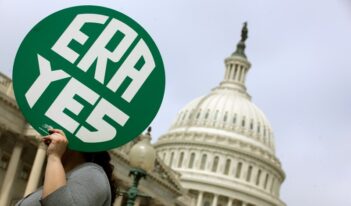
Despite a watershed ruling, the gaming industry must still contend with onerous and redundant state oversight.
With its decision in Murphy v. National Collegiate Athletic Association, the U.S. Supreme Court invalidated the Professional Amateur Sports Protection Act (PASPA), a federal statute that prohibited states from authorizing competitive sporting events. The decision allows states to determine whether to permit sports wagering within their borders.
Just weeks after the Court’s decision in Murphy, sports wagering has already commenced at casinos and racetracks in New Jersey and Delaware. In addition, Pennsylvania, New York, Rhode Island, West Virginia, and Mississippi have all passed legislation authorizing sports wagering. Several other states have introduced—but not passed—legislation that would allow some form of wagering on sporting events.
By all indications, the Court’s decision in Murphy is a watershed moment that dramatically alters the landscape of the gaming industry in the United States. The Court’s decision has birthed what is projected by some to be a multi-billion dollar revenue stream not only for casinos, racetracks, and sports pool operators, but also for a wide variety of technology and financial industry companies, including software developers, sports information services, data analytics, geo-location, identity verification, and payment processing companies that will play roles in the development of online and mobile sports wagering applications.
The expansion of sports wagering will also undoubtedly impact sports media and will have, at a minimum, an indirect—and in all likelihood positive—impact on the valuations of the sports leagues and teams that fought tooth and nail against New Jersey’s years-long effort seeking gambling legalization. Sports wagering will also likely have a significant impact on the states that choose to allow the activity, both in terms of additional tax revenues and increased economic activity.
Historically, the regulation of gambling has largely been left to the states. Federal legislation relating to gambling was primarily geared towards supporting state law gambling restrictions by regulating interstate activities that individual states did not have the power to address.
As such, like many prior federal statutes relating to gambling, PASPA did not impose an outright prohibition on sports wagering. Instead, PASPA made it unlawful for a state governmental entity “to sponsor, operate, advertise, promote, license, or authorize” a sports wagering “scheme.”
PASPA’s defect was not in its stated objective—the prevention of the spread of sports wagering and the protection of the integrity of professional and amateur sports. Rather, the Court found PASPA to be unconstitutional because it was inconsistent with the anticommandeering doctrine, an outgrowth of the Court’s 10th Amendment jurisprudence limiting Congress’s powers to direct orders to state governments. Quoting its prior decision in New York v. United States—a 1992 case that examined how the federal government regulated states’ disposal of radioactive waste—the Court in Murphy reiterated that “Congress may not simply ‘commandeer the legislative processes of the States by directly compelling them to enact and enforce a federal regulatory program.’”
Ironically, while holding that Congress could not restrict states from authorizing sports wagering, the Court observed that it was within Congress’s power to regulate the activity generally: “Congress can regulate sports gambling directly, but if it elects not to do so, each State is free to act on its own.” Although this language from the Court’s decision acknowledges the possibility of comprehensive federal regulation of sports wagering, it remains to be seen whether Congress has either the inclination or the political will to undertake the development of a regulatory system that would supplant the governmental oversight of sports wagering in the states where it is taking place.
From a regulatory standpoint, the Court’s determination in Murphy that PASPA was unconstitutional does not impact the enforceability of other federal statutes governing sports wagering or other forms of gambling, to the extent that they are not structured in a way that is inconsistent with the anti-commandeering doctrine.
In particular, the Interstate Wire Act of 1961, a statute originally intended to deter organized crime and racketeering, continues to present a significant encumbrance to the development of sports wagering in the United States. The Wire Act essentially prohibits anyone “engaged in the business of betting or wagering” from using a “wire communication facility” for the transmission bets or wagers, or “information assisting in the placing of bets or wagers” made on sporting events in interstate or foreign commerce. Courts have found that the Wire Act does apply to internet communications. The Wire Act contains a “safe harbor” provision which establishes that transmissions “assisting in the placing of bets or wagers” do not run afoul of the Wire Act so long as any such communications are transmitted between or among jurisdictions where betting on sporting events is legal.
The Wire Act is but one of several federal statutes relating to gambling that carve out exceptions for gaming activities permitted under state law and that are conducted entirely within a single state: for example, the Unlawful Internet Gambling Enforcement Act excludes intrastate transactions from the definition of “unlawful Internet gambling,” and the Illegal Gambling Business Act defines an “illegal gambling business” as one that is conducted in “violation of the law of a State or political subdivision in which it is conducted.”
Accordingly, each state that seeks to authorize sports wagering must confine operators to doing business exclusively within the state, or potentially between or among jurisdictions in which sports wagering is legal, in order to remain consistent with the Wire Act and other similar federal statutes. This approach necessitates that operators undergo costly and time-consuming licensure processes and submit to probity investigations in each jurisdiction in which they seek to do business. Although this practice is nothing new to companies operating in the gaming industry, given the proliferation of commercial gaming in recent years, the speed with which sports wagering is taking hold in states throughout the country, and the reliance of gaming and sports wagering on technology and the Internet in order to continue to grow and thrive, the traditional way of doing business seems increasingly onerous and redundant.
This essay is part of a series, entitled The Supreme Court’s 2017–2018 Regulatory Term.




